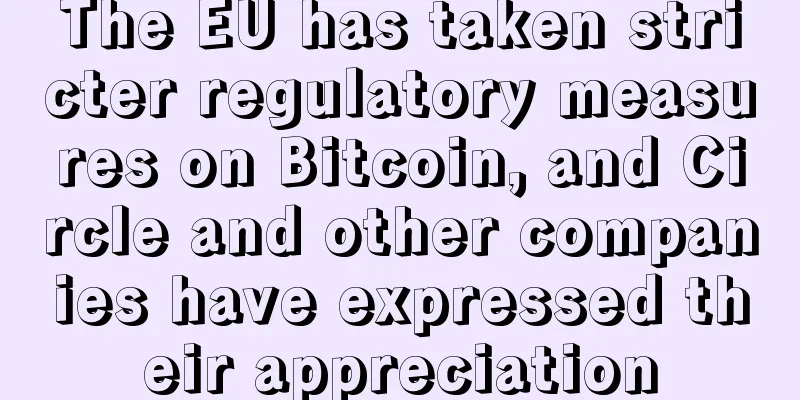The EU has taken stricter regulatory measures on Bitcoin, and Circle and other companies have expressed their appreciation

|
The European Commission (July 5) has introduced strict new rules for companies that operate exchanges or storage of digital currencies such as Bitcoin. The EU's executive body hopes to make their trading and storage services comply with anti-money laundering regulations when regulating banks and other financial institutions. This requirement is onerous. Companies must collect identification documents from their clients and keep detailed records. They must also monitor transactions on their platforms and report any possible risk of money laundering or terrorist financing, so established financial institutions find these requirements burdensome. However, this is not the case for Bitcoin companies, who welcome the increased scrutiny as a sign that digital currencies are gradually being taken seriously by governments. In fact, many well-funded companies have voluntarily implemented these regulatory measures for many years. Frank Schuil, co-founder of Safello, a Swedish Bitcoin exchange, said: "We have long expected this idea from the European Commission." Safello is not alone. Take Circle, for example, a digital wallet service that, like Goldman Sachs-backed Venmo, allows users to convert bitcoin, dollars and pounds to and from one another. It is regulated by the UK Financial Conduct Authority as an “electronic money transmitter” and is therefore already subject to strict anti-money laundering rules. In response to the proposed new EU rules, John Beccia, Circle’s general counsel, said: “We applaud the European Commission for taking industry advice and working hard to develop comprehensive anti-money laundering rules.” Indeed, neither Safello nor Circle plans to make any major changes to the way they identify customers or monitor transactions. A company like Circle, which has raised more than $130 million, will be well-funded and institutionally sound and will be able to escape the burden of the EU proposal. Meeting markets that facilitate cash transactions, such as Local Bitcoins or small bitcoin ATM networks, will face a tough time. “Small brokers will operate on a fraud prevention basis, and their compliance burden may be more difficult to handle than AML (anti-terrorism software),” said Safello’s Schuil. The EU’s new stance may not have an impact on the price of Bitcoin. According to data provider Bitcoinity, this is because most transactions in the EU are already under the background of anti-money laundering policies in place, such as Bitstamp. According to a news release from Bitcoinity, Kraken, the largest euro Bitcoin exchange, completed 62% of the volume in the past 30 days and requires customer identity information, so it is also regulated as an electronic money transmitter in Luxembourg. The EU’s new, hands-on approach to bitcoin regulation is already reflected in the pricing of the corporate sector. Once these voluntary behavioral measures become mandatory, it will mark the legalization of electronic currencies. (The European Commission’s proposal still has to be approved by the European Parliament and member states) |
Recommend
How does a birthmark on the head affect one's fortune?
In real life, most people will subconsciously fro...
A person with no future is destined to rely on his parents for his whole life.
It is normal for us to rely on our parents when w...
Argentina becomes one of the crypto-friendly countries
The probability of the Fed raising interest rates...
The older you are, the smaller your courage becomes.
Generally speaking, the older you get, the more m...
Tips for Phrenology
Physiognomy is one of the important schools of tr...
Goldman Sachs applies for new blockchain patent for foreign exchange market, and large companies begin to grab blockchain patents
For traders at large financial institutions, curr...
How many steps are needed to reach Web3?
"Has anyone seen Web3? I didn't find it....
Gaoronghui Capital's "Blockchain and Credit Decentralization White Paper"
Part 1: Blockchain technology is launching a new ...
VCs’ view on blockchain: Like the Internet in the 1990s, investing in it with a savage momentum
The underlying technology of Bitcoin, blockchain,...
What does it mean when a man has a gap between his front teeth? How is the career and financial fortune of a man with a gap between his front teeth?
In the eyes of many girls, the highest standard o...
Bitcoin returns to $71,000. How will the crypto market perform before and after the U.S. election?
On October 29, BTC returned to above $71,500, set...
Are people with moles under their eyes immature and willful?
People with moles on their eye bags tend to have ...
Analyzing all parts of a woman's face to see if she is blessed or has a lucky life?
Blessings represent a person's fortune and lu...
What does a middle-aged wealthy man look like?
Wealth is what many people yearn for. You know, i...
What does a birthmark on the forehead mean?
What does a birthmark on the forehead mean? Every...









